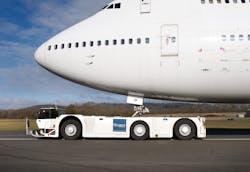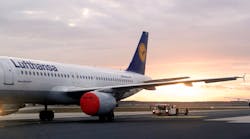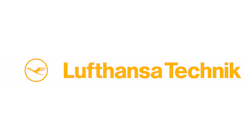TaxiBot Prepares For Test With Lufthansa
TaxiBot - a new aircraft tractor controlled by the pilot from the cockpit that pulls aircraft from the gate to the runway without using engine power - is set to take the next important step on its way to series deployment. A joint developing program of Israel Aerospace Industries (IAI), the vehicle manufacturer TLD, Airbus and Lufthansa Technik's subsidiary Lufthansa LEOS is preparing for a 6-months test of TaxiBot fleet under normal operating conditions at Frankfurt Airport in spring 2013.
The new tractor is designed so that the aircraft's nosewheel connects to a rotary table on the TaxiBot. This allows the pilot to control the aircraft using the cockpit steering systems just as the cockpit crew would if the aircraft were moving under its own engine power.
Sophisticated sensors combined with velocity control and GPS enable the pilot to maneuver the aircraft easily.
The system passed its early tests in spring 2011 with flying colors.
Experts and the Lufthansa pilots involved spoke of a promising step into the future of ecologically improved aircraft towing.
As a result, starting in May 2013 three TaxiBot Narrow Body tractors will be subjected to intensive tests with the Lufthansa B737 fleet in a normal operating environment at Frankfurt Airport, Lufthansa's hub.
The tests will include the collection of extensive operating data, the optimization of ground processes from push-back to take-off, and further refinement of the TaxiBot system with an eye toward planned full series production of the vehicle. During the remaining months of 2012, maintenance documentation and a training concept will be produced, and in early 2013 the certification process of the TaxiBot will be finalized and personnel will be hired and trained for the system tests.
Following the most recent tests in spring 2011, experts and the Lufthansa pilots involved spoke of a promising step into the future of ecologically improved aircraft towing. "We'll be supporting the next test phase closely and are very interested in using this cost-efficient, ecologically promising new aircraft tractor in normal operations after it has passed all its tests," said a confident Kay Kratky, Member of the Lufthansa German Airlines Board/ Frankfurt & Flight Operations.
Traditionally, aircraft tractors have been used only to push the aircraft away from the gate and pull it into the correct position.
Afterwards, the pilot starts the engines and the aircraft taxis to the runway under its own power. Yet a Boeing 747 consumes up to 700 kg of kerosene over the average distance it travels when taxiing to a runway at Frankfurt Airport.
With TaxiBot, in contrast, the pilot moves the aircraft to the runway with the help of the tractor and without the need to start the aircraft's engines, which results in significant cost savings and a reduction in the CO2 emissions.
Lufthansa Technik:
The Lufthansa Technik Group, with more than 30 subsidiaries and associates and over 26,000 employees worldwide, is one of the leading manufacturer-independent providers of technical services for the aviation industry. Its portfolio encompasses the entire spectrum of services for commercial aircraft: maintenance, repair, overhaul, modification and conversion, engines and components.
Pressekontakt:
Lufthansa Technik AG
Corporate Communications
Weg beim Jaeger 193
22335 Hamburg, Germany
Phone +49-40-5070-3667
Fax +49-40-5070-8534
www.lufthansa-technik.com/media
Corporate Headquarters:
Lufthansa Technik AG, Hamburg
Registration:
Amtsgericht Hamburg HRB 56865
Deputy Chairman of the Supervisory Board: Dietmar Stretz Executive Board:
August Wilhelm Henningsen (Chairman)
Dr. Peter Jansen
Uwe Mukrasch
Dr. Thomas Stueger



